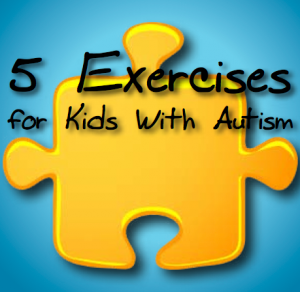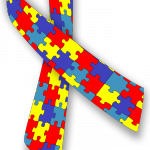Autism Exercise Topics: Proprioception and Sensory
The following guest post comes from PlayThroughAutism.com. Get more information about topics like this, including a free Autism Exercise Ebook sent directly to your email by subscribing here.
like this, including a free Autism Exercise Ebook sent directly to your email by subscribing here.
Proprioception and sensory are widely discussed topics in Autism literature, and understanding the implication on physical activity can be immediately actionable for getting our kids to exercise more effectively. Proprioception is essentially our body sensing and working with the world around us.
Let’s focus on proprioception in relation to our spatial senses. Spatial senses tell us where our arms and legs are as we move around. We use our proprioceptive senses when our mind tells our body how to physically and technically do the exercises we intend to perform.
However, propioceptive sense is more than that. It’s the feeling you get “in your gut” when you are falling, and how springboard divers and gymnasts know when they have done 2 twists instead of 3. Some kids love to experience this sense and jump off of things or rock back and forth. Controlling this sense can also be comforting for many kids with autism.
“The child with ASD will learn to roll, crawl, and walk, but the quality of their movements may be poor. As the child gets older, they may struggle to function at more sophisticated levels when they have not mastered these core skills. As a result of differences during development, children with ASD often have deficits in equilibrium and righting reactions (moving the body to maintain an upright position), protective reactions (putting a hand out to catch yourself when falling), and movement strategies (persistent w-sitting). These differences may present as clumsiness, lack of coordination, lack of attention, hyperactivity, gross motor skill delay, flat feet, toe-walking, postural instability, poor posture, decreased respiratory control, oral motor difficulty, and flexibility restrictions.” (Ghaziuddin & Butler, Gillberg, Kohen-Raz et al., Hallet et al., Vilensky et al.).
So what does proprioception and sensory mean for helping our kids with autism exercise?
It goes without saying that exercise is important for our kids’ physical health. However, exercise and play therapy have been shown to improve the lives of kids with autism by supporting self-image, integrating with peers in natural ways, decreasing unwanted behavior impulses, and exploring personal capabilities.
For instance, a therapist can use play observation to assess balance, protection reactions, and motor planning skills. The therapist can also assess the child’s posture in different positions, determining how posture changes the child’s motor control. The therapist can then analyze which muscle groups are being underused or overused, and help set a plan to correct that. For example, a child who is a “toe walker” may be overusing their calf muscles. Understanding how to incorporate more active utilization of the opposing muscle group, and stretches to loosen up the calf muscle may help somewhat. For a look at a quick assessment of posture using a simple squat, check out this post.
Next step – decide which actions specifically we are trying to motivate relating to fitness. Our list probably looks something like this:
- Improve postural control to increase stability.
- Improve balance to improve motor control.
- Learn to perform the sequencing, timing, and execution of individual components of exercises.
- Maximize sensory processing and organization skills to put into controlled motor skills.
- Lay down the foundations of gross motor skills to support participation in community and peer activities.
Awareness of the Challenges of Proprioception for Kids with Autism
Sensory integration refers to the brain’s ability to receive and process sensory stimulations from the environment. This includes three basic senses – tactile, vestibular, and propioceptive.
The tactile system refers to the nerves under the skin’s surface that send information such as light touch, pain, temperature, and pressure to the brain. This is important for perceiving the environment, as well as protecting from dangers. Issues with this system could lead to hyper- or hyposensitivity (such as tactile defensiveness which makes a person extremely sensitive to light touch).
The vestibular system refers to senses and structures within the inner ear that detect movement and changes in the position of the head, such as when the head is up or down, even when the eyes are closed. Issues with this system may be on either extreme. One extreme is that they are fearful of even small normal changes in vestibular stimulation making it difficult to learn to walk on stairs and unstable surfaces. On the other extreme, the child may like these sensations and want to jump, spin, and roll excessively.
The proprioceptive system, what we want to focus on for our exercise purposes, refers to the muscles, joints, and tendons that provide awareness of body position. When proprioception is functioning properly, a person’s body position is integrated into their sensory awareness and can be automatically adjusted. For example, the propioceptive sense helps us to step down a stair smoothly, or to judge the necessary speed to sit in a chair. This sense also helps with using fine motor skills such as writing with a pencil, or buttering a piece of toast.
Issues with the propioceptive sense are evident through clumsiness, falling often with out being able to catch yourself, odd body postures, difficulty with dexterity and apprehensiveness with new motor skills.
Motor planning refers to a persons ability to plan and execute different motor tasks. This takes into account the following systems to accurately take in information, perceive it properly, and then executing on those senses with appropriate actions.
What Can This Tell Us?
The implications of dysfunctions in these sense areas can mean lowered activity levels and being easily fatigued or easily distracted. It can also mean that children with autism fluctuate between these extremes and can be hard to predict. Becoming frustrated, aggressive or sad, and withdrawing are all common.
The goal is to eliminate environmental senses and stressors that are not consistent with the desired exercise outcome and to increase the motivation techniques the help to support proper exercise. Read here for information about motivation.
Finding Quick Fixes for Frequent Sense Issues During Exercise:
Sight: Sensitivity to bright and flashing lights or other people or objects moving quickly in the exercise area can cause too much stimulation to be able to focus on the requested exercise. Try to move toward an area of the gym or exercise room where other people are not running or throwing things. Ask that flash photography is not allowed in during your training times. If it’s possible, try to dim the lights a little during your exercise times or seek out natural lighting. If these options aren’t available, try to move toward a corner of the exercise area and face the corner eliminating other distractions.
Hearing: Loud music is a staple of most people’s workouts. However, loud and/or fast paced music may cause too much distraction and simulation. The person may not be able to filter multiple sounds at once and might make it hard to focus. First try eliminating extra noise, such as turning off the music. However, the silence may also be distracting so try to find music to add with a slower beat and less percussion. Find the right music may be a good way associate exercise with something the kids already like. For instance, one of our athletes loves High School Musical. Associating the High School Musical soundtrack as a reward for exercising well has proven to be a big help in keeping him focused.
Touch: This can be a make or break point for many of our athletes with autism. The feel of our cross-stitched trampoline mat can be a great sensation on our kids’ feet and the feel of the foam in our foam pit can become fascinating. However, the chalk on the mats, or the instructors hands on their sides as they attempt to use the bar, can be completely devastating. Find the sources of distress and see if they can be removed. However, often the sources of pleasure can be just as distracting. See if there is a way to turn these into awards associated with exercising. Using a foam block the kids loves to touch as a target on the floor when we are doing bend and reach exercises has proven to be a big help.
Smell: It’s not embarrassing, people smell sometimes when they exercise and gym’s or other exercise areas often try to mask it with worse smelling air fresheners. Sweat is natural, lilacs mixed with aerosol and rubbing alcohol is not. Ask to have ventilation and better airflow as a means to control scent, and to eliminate any artificial air fresheners. If this isn’t possible, try to open a nearby window or door yourself to get the scent as neutralized as possible.
Finally, let’s focus on internal and external feedback. Internal feedback is when the child feels his or her body in space and can adjust as necessary. External feedback is when the child is told to change his or her body position or is somehow guided to make the correction. We have seen a lot of progress with trying to incorporate both internal and external feedback, by using mirrors to allow our athletes to see themselves make the corrections that either they feel are best internally, or we are asking them to make verbally or guiding them to make through contact.
Thank you for reading and I hope that you can use this information to help create a healthy and physically active lifestyle for your child with autism. For more exercise ideas, get the e-book below!
*Much of this research comes from this article: Dr. Joni Redlich, DPT, Autism Spectrum Disorders and Physical Therapy: The Motor Connection. January 2010
Please feel free to ask any questions or share any ideas in the comments box below.


